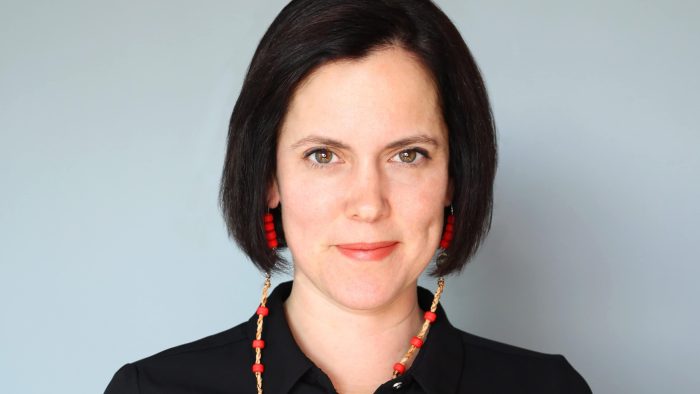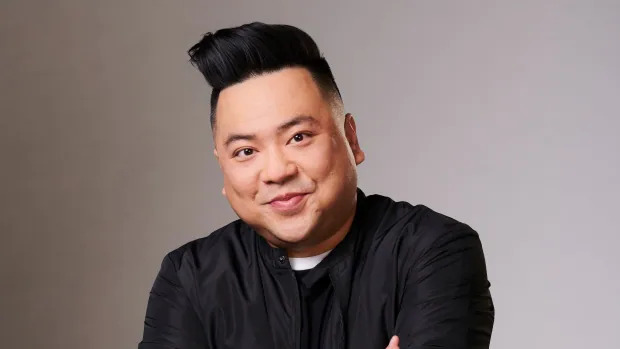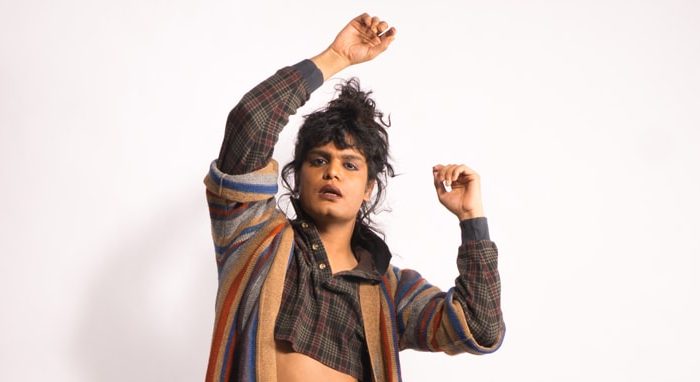Queer Eye: Meet Blake Mawson
Blake Mawson is on a mission to bring queer culture to audiences, but don’t expect to see shiny, happy people. The queer 39-year-old writer/director began his career as a teen actor working in his hometown of Vancouver, but after spending five years in Berlin during his twenties, he returned to Canada determined to step behind the camera.
His award-winning debut short film PYOTR495 (2016), a horror about a Russian gay teen who turns the tables on a pair of homophobic abusers, highlighted Mawson’s deft storytelling abilities. His music video for queer country star Orville Peck’s love song “Hope to Die” showcased his poetic eye, and now he dives into the world of dark comedy, directing all six episodes of the offbeat I Hate People Hate, People Hate Me.
Set to air on CBC Gem in the Fall, the digital series was created by, and stars, stand-up comic Bobbi Summers, who plays the sardonic Jovi, who along with his best friend Tabitha (Lily Kazimiera), struggle to find a place within the queer community. Smart, a little poignant, and wickedly funny, it’s the type of show CMF is proud to support. We caught up with Mawson at his home in Toronto where he talks about the new series, his journey to becoming a director and his abiding love of horror.
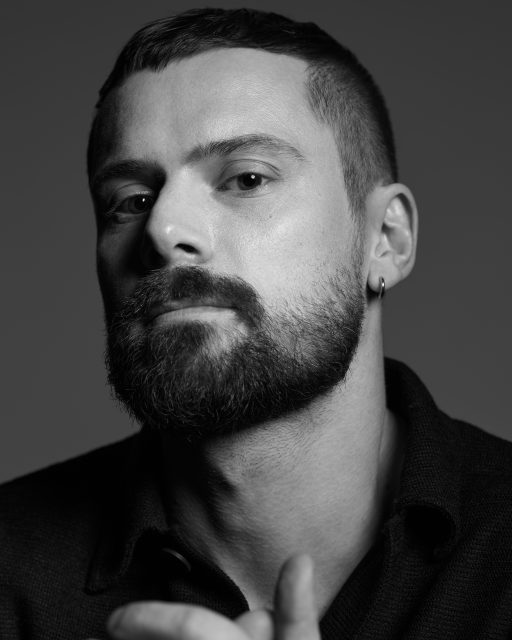
Q: How would you describe I Hate People, People Hate Me?
A: Jovi (Bobbi Summers) and Tabitha (Lily Kazimiera) are these two best friends who are queer outsiders within their own community. They're not really valued within the LGBTQ+ community, and as a result, they feel very jaded and pessimistic as to how they're treated and are overlooked while everyone around them seems to be thriving. But they're not really doing themselves any favors either, being jaded is not helping them get any further.
Q: And yet they are very funny in their despair.
A: Yes, the series is this kind of dark comedy, and at times it’s extremely gross [laughs]. I don't know if we've had anything come out of Canada since Porky's that will be this disgusting at times.
Q: What I love about the show is the fact that it claims the “outsider” aspects of queer culture. It is wonderful to see how LGBTQIA+ culture has been accepted into mainstream media, but I appreciate the way the show celebrates our unique culture.
A: Yes, for sure! I think that's what I really gravitated towards when I met Bobbi Summers. He has a very distinct perspective that we don't often see in queer cinema or on TV. I find there's a real pressure or expectation to make our queer characters very tidy, they need to be shown in a good light, otherwise, they might be perceived as homophobic or something. But flawed characters are something that I'm extremely drawn to. There's so much that's relatable in Jovi's journey. And I think so many people who have never felt valued, or have felt like the underdog, I think a lot of people will relate to Jovi.
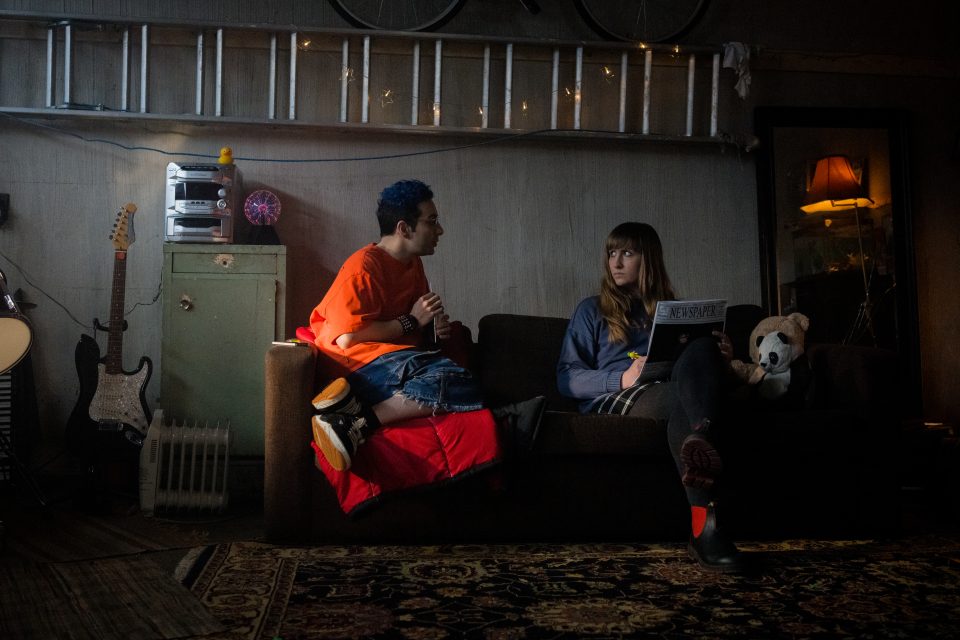
Q: The show is visually interesting, from close-ups to long shots, you really capture Jovi and Tabitha’s sometimes strange and offbeat life.
A: Thank you. In our early conversations between Bobbi and I, we talked in terms of things that had inspired him, everything from Ghost World to Welcome to the Dollhouse and some Saturday morning cartoon shows that he had watched growing up. I think it's cinematically vibrant in places, but then often in Jovi's loneliness and his disdain for the world and his depression, you can see and feel that too.
Q: Let’s talk about your own journey. You grew up in Vancouver and started acting as a teenager. Did you always want to act?
A: I was interested in acting. I went to school in Richmond, BC, and it was a rough school, and I ended up getting thrown through a vending machine because I was gay. And my mom said, you know, if you want to start working and you don't want to go back to that place you can do that. I didn’t want to go back so I chose to start acting. I got an agent and at first, I was doing things like doubling for Pyro (Aaron Stanford) in X2 and then I got small roles on things like Freddy vs. Jason, some TV shows. But I also fell in love around that time and decided to move to Berlin with my then partner.
Q: You spent about five years in Berlin and then returned home but your love of acting changed.
A: When I came back, I found that I didn't really get the same joy that I once did from acting. I felt like I had more I wanted to add to the conversation, and I didn’t want to be constrained to these boxes that I felt was auditioning to fit into.
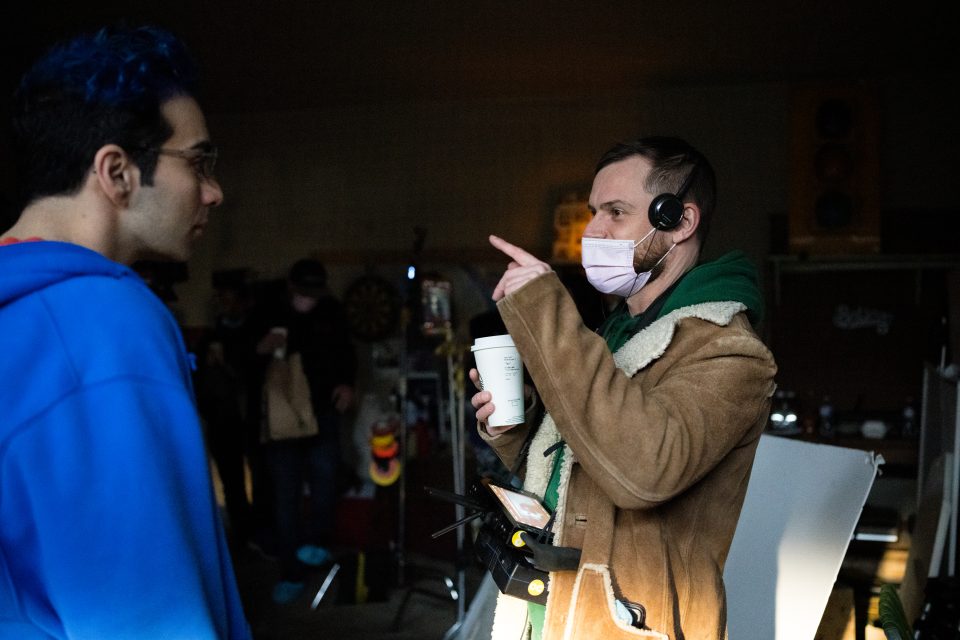
Q: During that time were you openly out and going to auditions?
A: No, not at all. At that time there was no cachet to being queer. I look at younger generations now and they're on TikTok and social media, and it's like I have friends who hope their kids are queer because it's kind of punk or cool to them! But that was not the case back then. In terms of my acting life, I had to present a certain way, and I remember one casting director told my agent that I was too gay. I think to be an out gay actor now, there's more opportunities.
Q: Was it then when your focus switched from acting to directing?
A: Yes, I felt like all these people I knew were getting their ideas funded and put forward, and I felt I had something to contribute as well, and I wanted to try for that. So, I applied for BravoFACT, and I made my first short PYOTR495. That was my entryway into directing, and I knew it was my calling because the film opened more doors for me in just one year's time than 10 years of acting.
Q: PYOTR495 sees a gay teenager meet a man for a hookup only to be abused. That is, until he turns the tables on his abusers. The film is based on real-life homophobic attacks that took place in Russia, and you decided to tell the story as a horror film. Why?
A: Horror has been a passion of mine since I was a little kid and introduced to me by my father and his VHS tapes. For me it’s about focusing on what you're passionate about and do it in the voice that you know you can best get your point across, using those tools.
Q: What are some of the horror films that influenced your work?
A: That’s always a tough question for me. First of all, my long-term memory is terrible [laughs]. I love John Carpenter films like The Thing. I also really love David Cronenberg, obviously body horror working within queer subject matter is something I'm very influenced by. And I love a lot of ’60s and ’70s weird queer horror like Jesus Franco's Vampyros Lesbos set in Turkey where the vampires are sunbathing and living in this psychedelic house on the ocean.
Q: And you are presently working on your debut feature film, Perennials. What is that about?
A: It's a supernatural thriller that centers around two queer women in 1960s upstate New York. I'm developing it with Gharrett Paon, who produced the Indigenous coming of age road pic Wildhood. We've had some support from Telefilm and we're developing a third draft and we're almost ready to fund it. So that is exciting!
